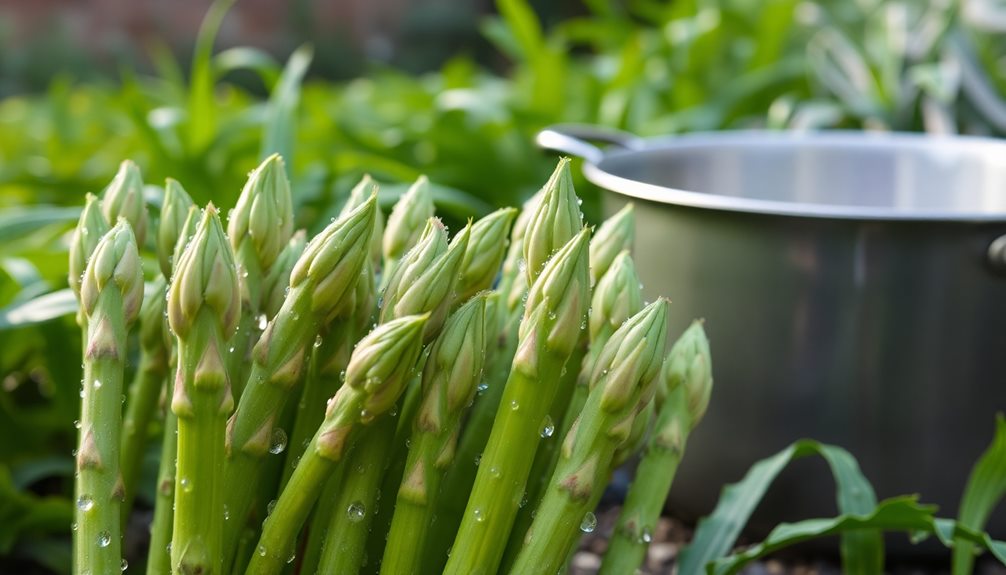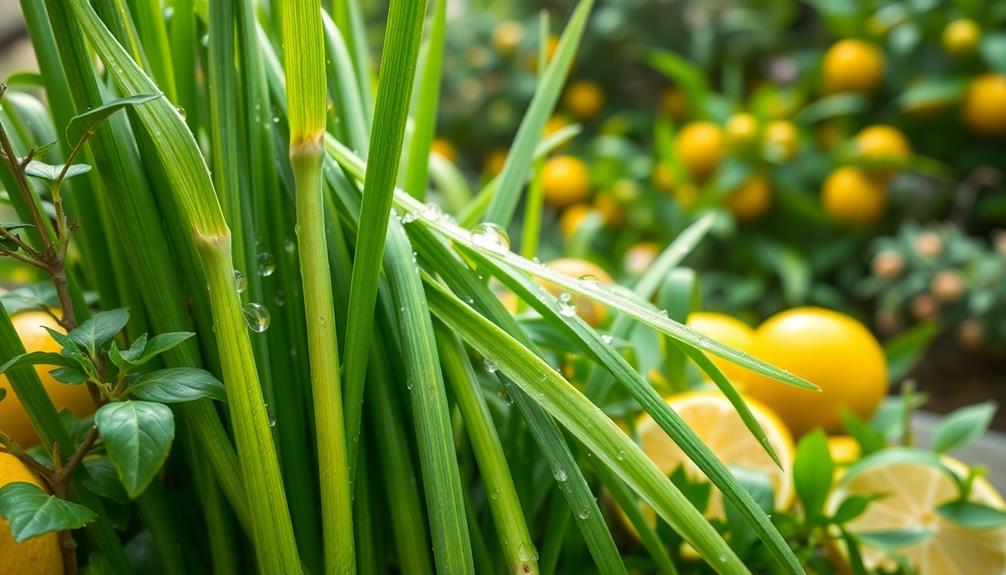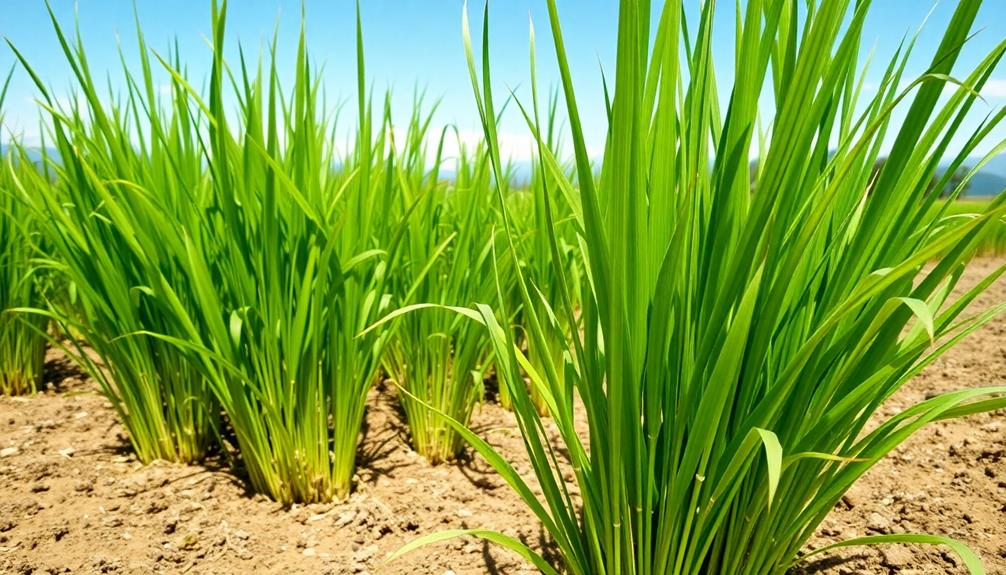When you eat asparagus, you might notice a strong smell in your pee. It often resembles rotten eggs or cabbage! This distinct aroma comes from asparagusic acid, a compound in asparagus that breaks down into sulfur-containing byproducts. Not everyone notices this smell, though, since some people can't detect it at all due to genetics. It's a normal reaction and can even spark funny conversations at family dinners or picnics. So, if you ever find yourself giggling about it, you're not alone! Stick around, and you'll uncover more fascinating facts about this quirky veggie and its effects.
Key Takeaways
- Urine after asparagus consumption often has a strong, sulfur-like odor resembling rotten eggs and cabbage.
- The smell results from the breakdown of asparagusic acid into sulfur-containing compounds.
- Not everyone experiences the odor due to genetic differences in detecting it.
- The intensity of the smell can vary based on individual body chemistry.
- The unique odor can spark humorous conversations during shared meals or dining experiences.
Introduction
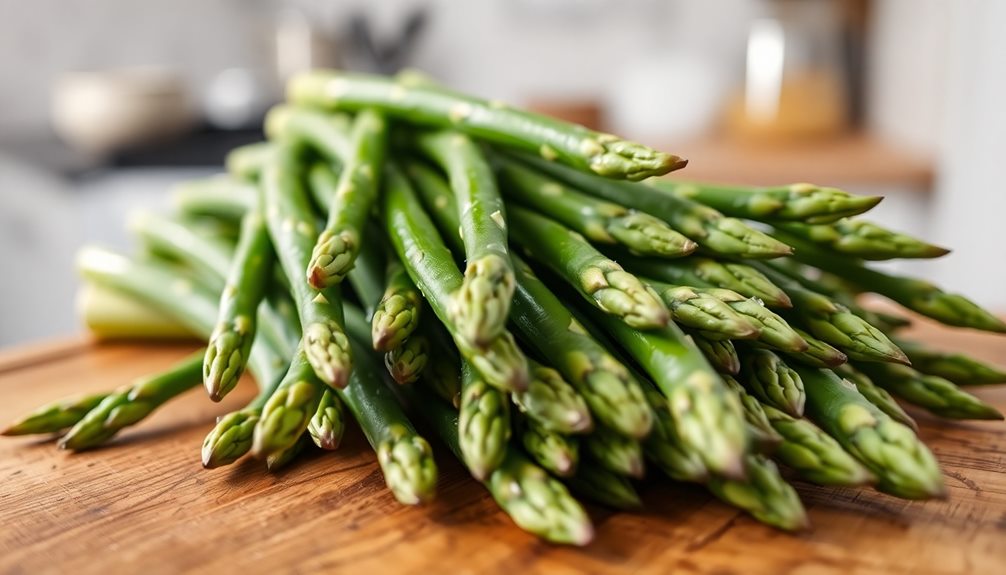
Asparagus is a unique vegetable that not only delights the palate but also often surprises you with its aftereffects. You might think of this green spears as just a tasty addition to your meal, but there's more to it than meets the eye. When you eat asparagus, your body processes it in a special way, leading to some fascinating changes.
You may have noticed that after enjoying a serving of asparagus, your pee smells different. It's kind of like a secret your body shares after the meal! This unexpected twist can catch you off guard, but you're not alone. Many people experience this phenomenon, and it's caused by the breakdown of certain compounds found in asparagus.
This vegetable is packed with nutrients and has a rich history, making it a favorite for many. As you dive deeper into the world of asparagus, you'll uncover all sorts of interesting facts.
Whether you love it or are just curious, understanding this quirky aspect of asparagus can make your dining experience even more enjoyable. So, let's explore the science behind that unusual smell together!
Description of the Smell

After enjoying a meal featuring this green vegetable, you might notice a distinct odor wafting from your urine. This smell can be quite surprising, and many people describe it as a strong, sulfur-like aroma. It's a bit like a mix of rotten eggs and cabbage, which can catch you off guard! You may find it amusing or even a little embarrassing, but it's perfectly normal.
The scent tends to be quite potent, so don't be alarmed if you notice it right away. Some say it's similar to the smell of cooked asparagus itself, but intensified. The odor may vary from person to person, with some experiencing a more noticeable fragrance than others. This can depend on how much asparagus you've eaten and your unique body chemistry.
When you think about it, it's fascinating how a simple vegetable can create such a strong reaction in your body. So, if you catch a whiff of this unusual smell, just remember it's all part of the asparagus experience! Embrace it, and consider it a quirky reminder of the meal you just enjoyed.
After all, nature has its own way of letting you know what you eat!
Source and Composition

Derived from the breakdown of certain compounds in asparagus, the unique smell in your urine primarily comes from asparagusic acid. Asparagus contains this compound, which your body processes after you eat the vegetable.
When your body breaks down asparagusic acid, it transforms into various sulfur-containing byproducts. These byproducts are what create that distinctive odor you might notice when you go to the bathroom after a meal of asparagus.
You might wonder why not everyone experiences the smell. It turns out that not everyone's body breaks down asparagusic acid in the same way.
Some people have a specific gene that makes them unable to detect the odor, while others simply don't produce it in their urine. Isn't that fascinating?
Typical Scenarios or Environments

When you enjoy a meal featuring asparagus, you might find yourself in a few typical scenarios where the distinctive smell becomes noticeable.
Picture this: you're at a family dinner, and someone serves a delicious asparagus dish. As you savor each bite, you can't help but wonder about the aftermath. Later, when nature calls, you might notice a strong odor that surprises you.
Another common setting is a picnic with friends. You've packed a fresh salad topped with grilled asparagus. Everyone's enjoying the meal, laughing, and sharing stories. Afterward, as you all take a break, you might experience that unmistakable scent when someone heads to the bathroom.
You could also be at a fancy restaurant, where asparagus is a featured vegetable. As you indulge in the fine dining experience, you might overhear a conversation about the peculiar smell that can come after eating asparagus.
In each of these scenarios, the asparagus pee smell becomes a shared experience. It's a quirky reminder of the vegetable's unique effects, connecting you to those around you in a light-hearted way.
Emotional or Cultural Associations

Asparagus often evokes a mix of emotions and cultural associations that can enhance your dining experience. When you think of asparagus, you might picture a fancy dinner party or a springtime picnic. This vibrant green vegetable often brings to mind fresh, healthy meals, making it a favorite among food lovers.
In many cultures, asparagus symbolizes celebration and abundance. You might recall the excitement of trying asparagus for the first time, perhaps roasted with olive oil and garlic, filling your kitchen with delicious aromas. It's not just a dish; it's a memory that connects you to loved ones and special moments.
On the flip side, asparagus can also spark some funny reactions. If you or your friends have ever experienced the infamous asparagus pee smell, you likely had a good laugh about it. This quirky side effect often becomes a playful topic of conversation.
Health or Safety Considerations
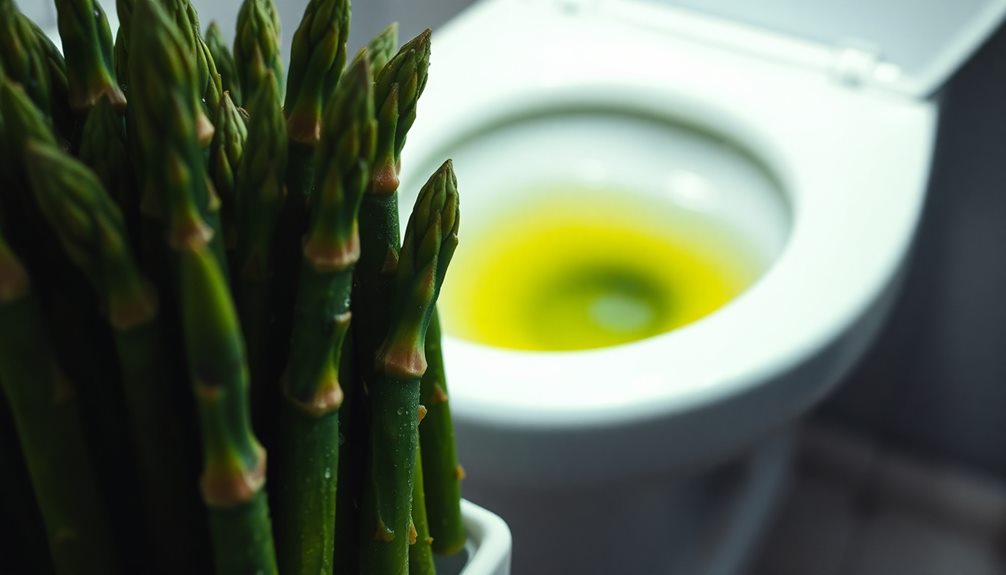
While the cultural associations and memories tied to asparagus can enhance your enjoyment, it's important to consider some health and safety aspects as well.
First off, asparagus is packed with nutrients. It's full of vitamins A, C, E, and K, plus fiber, making it a great addition to your meals. Additionally, maintaining a balanced diet rich in vitamins can support overall health and might even contribute to the importance of flossing for kids by encouraging healthier eating habits.
But if you have a history of kidney stones, you might want to be cautious. Asparagus contains oxalates, which can contribute to stone formation in some people.
Moreover, you should always wash your asparagus thoroughly before cooking. This helps remove any dirt or pesticides that might be lingering on the surface. Cooking asparagus can also make it easier to digest, reducing any potential tummy troubles.
If you're pregnant or nursing, asparagus is generally safe, but moderation is key. It's best to consult your doctor if you have any concerns.
Pay attention to how your body reacts after eating asparagus. If you notice any unusual symptoms, don't hesitate to seek medical advice.
Final Thoughts

Ultimately, enjoying asparagus can be both a delightful and nutritious experience. When you savor this vibrant green vegetable, you're not just treating your taste buds; you're also boosting your health.
As you explore the world of asparagus, you might notice a unique smell in your urine after eating it. This phenomenon is due to certain compounds in asparagus, and it's completely normal.
Don't let the smell discourage you! Instead, think of it as a quirky reminder of the healthy choices you're making. Asparagus is packed with vitamins, minerals, and antioxidants, making it a fantastic addition to your meals.
Whether you roast it, steam it, or toss it in a salad, you're giving your body a wealth of benefits.
Next time you enjoy asparagus, embrace the whole experience, smell included. Share your thoughts with friends and family; they might even find the smell amusing!
Frequently Asked Questions
Can Everyone Smell Asparagus in Their Urine?
Not everyone can smell asparagus in their urine. It depends on your genetic makeup and how your body processes certain compounds. If you don't have the genes, you won't notice any distinct odor.
Does Cooking Asparagus Affect the Smell?
Cooking asparagus does change the smell. The heat breaks down certain compounds, reducing the intensity of the odor. So, if you don't want a strong scent, try steaming or boiling it gently.
Is the Smell of Asparagus Pee Permanent?
The smell from asparagus pee isn't permanent. If you don't eat asparagus again, the odor fades within a day or two. Your body quickly processes it, so you won't notice it long-term.
Can Other Foods Cause Similar Urine Smells?
Yes, other foods can cause similar urine smells. For instance, garlic, onions, and coffee might contribute distinct odors. Your body processes these foods differently, resulting in unique scents that can surprise you after meals.
How Long After Eating Asparagus Does the Smell Appear?
After you eat asparagus, you may notice the smell in your urine within 15 to 30 minutes. It varies by individual, but you'll likely detect it sooner rather than later, depending on your metabolism.
